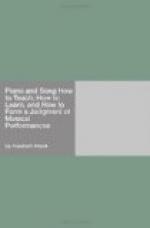DOMINIE (aside to Emma). What an evening of singing! Oh dear!
MR. GOLD (who has been earnestly talking about stocks all the evening in an adjoining room, rushes in, but rather late, after the close of the song, and impetuously presses his wife’s hand). Marvellous! magnificent! delicious! wonderful! My dear, you are in excellent voice this evening. If Jenny Lind could only have heard you!
MR. PIOUS. Charming! superb! how touching! There is a religious character in this piece, something holy about it! I beg of you, do sing that air by Voss, “True Happiness.” That will make our enjoyment complete; it is truly ravishing! There is something divine in singing, and your expression, your feeling, Madam! You give yourself up so entirely to the composition!
(Mrs. Gold has already taken up “True Happiness,” and can hardly wait while Mr. Forte murmurs off the introduction, quite after his own fancy, with a sentimental piano_. Mr. Pious drops a tear at the close of the introduction, the four bars of which have been transformed into eight bars by the great virtuoso. During the tremulous, affected performance of “True Happiness,” Mr. Pious rolls up his moistened eyes; and, at the end of the first verse, where the accompanist once more gives the reins to his fancy, he says, “I am speechless, I cannot find words to express my emotion!"_)
DOMINIE (aside to Emma). That you may call forged sentiment, the counterfeit of feeling. You hear now how one ought not to sing. For an earnest, true musician, such a warmth in singing is only empty affectation, disgusting, sentimental rubbish, and hollow dissimulation. You will, however, frequently meet with such amateur infelicities.
(Mrs. Gold has finished singing all the verses of “True Happiness,” and seems now to have almost entirely recovered. Mr. Gold continues to converse about stocks in the adjoining room. Dominie remains with Emma at the end of the parlor, depressed and worried.)
MR. FORTE (keeps his seat at the piano, and says in French to Mrs. Gold). Madam, you have reached the climax of the beautiful in music. I count it one of the happiest moments of my artistic tour to be allowed to breathe out my soul at the piano, in the presence of one like yourself. What a loss, that your position must prevent you from elevating the German opera to its former greatness, as its most radiant star!
MRS. GOLD (by this time quite well). I must confess that Jenny Lind never quite satisfied me when she was here. She is, and must always remain, a Swede,—utterly cold. If she had been educated here, she would have listened to more passionate models than in Stockholm, and that would have given the true direction to her sensibility.
MR. FORTE. You are quite right; you have a just estimate of her. In Paris, where she might have heard such examples, she lived in perfect retirement. I was giving concerts there at the time; but she refused to sing in my concerts, and therefore she did not even hear me.




